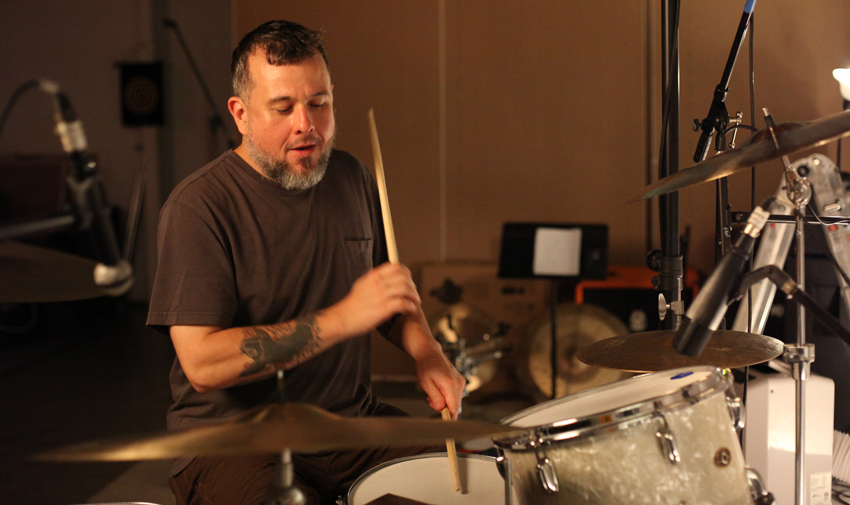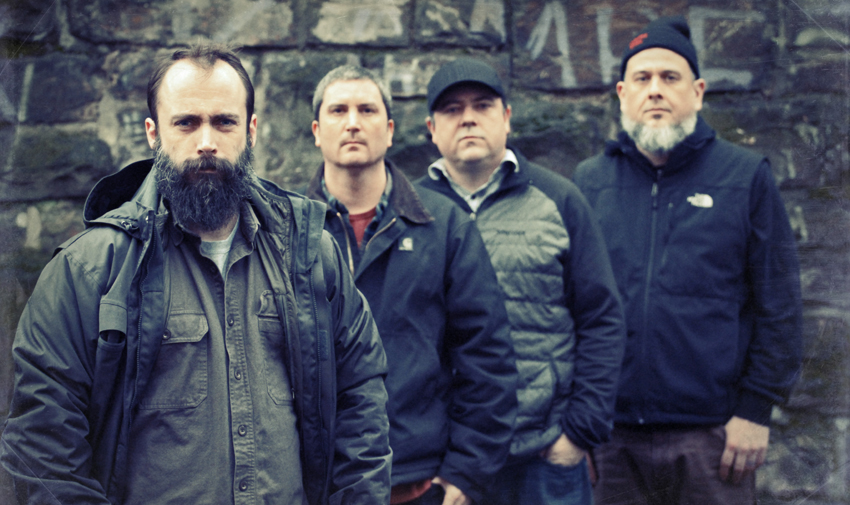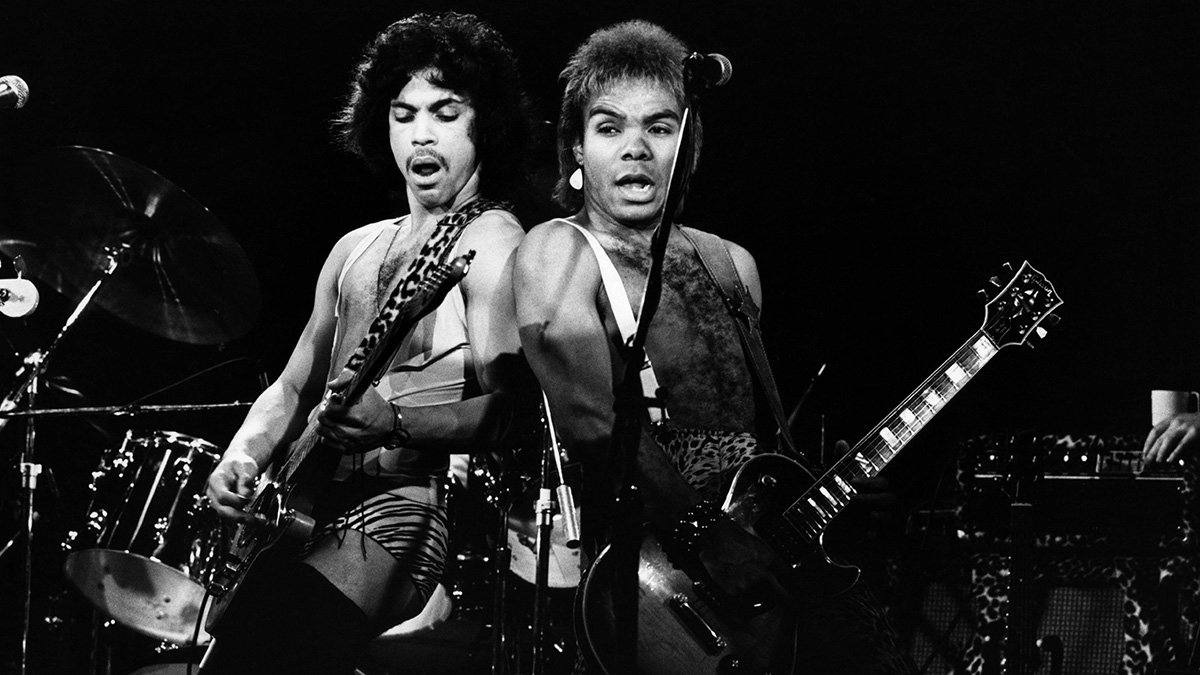JP Gaster, Clutch
The god of groove speaks

"I think as a drummer, regardless of what musical setting you're in, whether it's playing in a rock 'n' roll band or a reggae band, your primary job is keeping time, that's first and foremost," says Clutch drummer Jean Paul Gaster.
Sounds easy, right? Well, for Jean Paul keeping time isn't just about laying down a thick groove. It's also dodging Tim Sult's gargantuan guitar lines, clearing space for frontman Neil Fallon's rock rasp and judging when to bust out his own impeccable chops.
When we spoke to Jean Paul backstage ahead of a recent Clutch show the sticksman had plenty to say about tasteful drumming, the importance of versatility and why he has the best job in the world.
Interview: Rich Chamberlain
Clutch is a band known for its waves of big riffs and impressive musicality - how does that influence your playing as a drummer?
"You've got to keep solid time all night long. After that you have to look at whatever the lead voice of that music is. That doesn't have to be a vocal, but most of the time it is. But you could be supporting a particular guitar line or bass part."
In Neil Fallon you have a frontman that is half singer, half preacher - audiences hang off his every word. Do you have to be mindful of that when playing live?
Get the MusicRadar Newsletter
Want all the hottest music and gear news, reviews, deals, features and more, direct to your inbox? Sign up here.
"The vocal is the focal point of the music for most people so my job is to support that vocal. Depending on how Neil is delivering his lines and what kind of rhythmic and melodic delivery he has, that all goes into it. That can mean I play a straight beat or it can become more involved. It's fun to push the boundaries a little bit, pushing and pulling the groove while keeping the vocal in mind."
"Those things you pick up when first listening to music create who you are as a player"
The band is renowned for its groove, you must take that as a compliment to your playing...
"That is the highest compliment you can pay a drummer. A lot of that comes from when I was young growing up in the Washington area and there was a local kind of music there called gogo. It was all around and I didn't realise it was a local sound. I loved hearing these gogo records, bands like Trouble Funk and Experience Unlimited. The groove on those records is like a damn freight train, you can't deny it.
"Those things you pick up when first listening to music create who you are as a player. Unconsciously I took those sounds in and when I started to play drums those rhythms were always in the back of my head. Those rhythms went hand in hand with big riffs and I still think about that to this day."
Is knowing when to lay back and when to stretch out key?
"You don't step on the vocal, don't step all over music. Leave plenty of room for the music to breathe. When you do want to put in a fill I think about subdividing the quarter note. One of my favourite drummers is Elvin Jones and nobody had a better grasp of subdividing the music than Elvin, but at the same time his tempo was rock solid. It's interesting to hear how he would push and pull against that quarter note.
"When it comes to the time to play a fill in the set, I think about how I'm going to subdivide the quarter note. Rarely will I play a blazing fast fill, that kind of playing isn't interesting or challenging to me. I'm more interested in putting space in the music and creating a feeling. Drumming is not a physical competition."
Video: JP Gaster warms up during the Earthrocker sessions
That drumming isn't a sport is lost on some people...
"I used to travel with a Roland practice pad with a metronome built in. I'd be playing backstage and another drummer might check it out. I'd have the bpm down to 65 or something, well the first thing that drummer does is crank the bpm to 210 and then he beats himself to death! That's a pitfall of drummers. Speed is not the key to success. I enjoy practicing things very, very slowly."
With so much going on in Clutch's music, how do you keep your playing tasteful yet make the drums stand out amid so many big riffs?
"It's important as a drummer to be able to play anything that comes at you"
"I just think of those gogo drummers. Guys like Brandon Finley who played for Chuck Brown. The groove that the gogo guys put across was undeniable. If you just listen to the rhythm of the riff and then think of grooves you've heard you can refer back to them, whether it's a Led Zeppelin record or a Black Sabbath record, these rhythms go hand in hand with the riffs. It's important as a drummer to be able to play anything that comes at you."
Is simply playing day after day the best way to arm yourself with that kind of versatility?
"You have to. That's what makes me want to play drums every morning, the idea that I will sit down and there will be something that I want to learn about and master. The more you do that, the more challenges and opportunities will come to you. If there ever comes a day when you say, 'Yeah, I know a lot about drums,' then you don't know a thing about drums!"
There has always been a jam band element to Clutch, how important has that been in shaping your style?
"The improvisation part is probably my favourite part of the band. It's also the part of the band that most enabled us to have our voice. Getting up in front of 65 people or 6,500 people and playing something that hasn't been rehearsed gives you a certain set of skills that leads back to the music. It leads to more interesting songs and allows you to be more creative.
"That's not to say that everything we try is great. Sometimes it's a train wreck! But you have to take chances, we're not a band that plays the same set and says the same things every night. For me that would be sterile, it'd be more like a school play than a rock concert."
"In Clutch you play whatever the hell you want"
How much freedom is there to improvise live?
"In Clutch you play whatever the hell you want. The songs have structures and we try to be true to those but we always want to inject new energy. It can just be on Earth Rocker I might push the hi hat notes together, sometimes I might play it swung, sometimes I play it straight. It's creating new energy."
That must keep you on your toes…
"We look forward to those parts of the set. It's exciting when someone injects a new way of looking at something that you've played 1,600 times. In that way I'm convinced that playing drums in Clutch is the best job in the world."

“I oversaw every element - not just the music and the lyrics and the melodies and the production, but also the merch and the fan clubs and everything”: Mike Portnoy talks about his years away from Dream Theater
“I’m surprised and saddened anyone would have an issue with my performance that night”: Zak Starkey explains why he got fired from The Who









